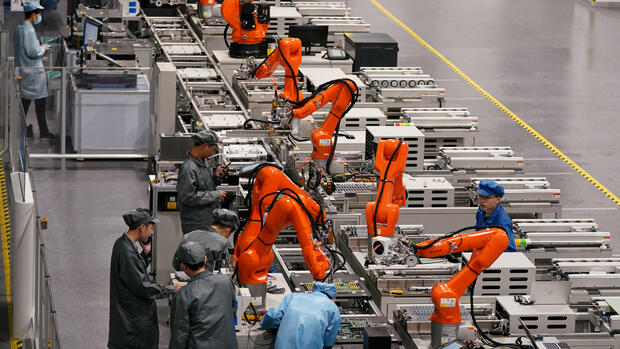Companies have also been demanding more equality, especially in public tenders, for a long time.
(Photo: dpa)
Beijing Despite clouded growth prospects and growing geopolitical tensions, German companies are planning to increase their investments in the world’s second largest economy.
This is the result of a lightning survey by the German Chamber of Commerce in China (AHK China), which was published on Thursday. 288 German companies in China took part in the survey, which was conducted in mid-May.
Around a third of the companies rated their business prospects worse and expect lower profits than in September last year. At that time, the strict zero-Covid policy still applied in China, and companies were constantly concerned about a lockdown. Sentiment also deteriorated in Chinese industry in May, as shown by the official purchasing managers’ index for the manufacturing sector.
The economic recovery is currently “less dynamic than many had hoped for,” said AHK China Chairman Hubertus Troska. In addition, geopolitical tensions have reduced expectations of a rapid improvement in the business environment.
Nevertheless, more than half of the companies surveyed by the AHK China want to increase their investments in the People’s Republic in the next two years in order to remain competitive in the important market. This is a little more than in the previous year, but significantly less than in 2020 and 2021. At that time, more than 70 percent of the participating companies had planned higher investments.
Reasons for increased caution
The most important reasons for the increased caution are the clouded economic outlook (58 percent), the ongoing geopolitical tensions (42 percent) and China’s quest for economic independence (28 percent). The Chinese government is increasingly demanding that companies operating in the country manufacture locally and use domestic suppliers.
The economic recovery is currently “less dynamic than many had hoped for,” said AHK China Chairman Hubertus Troska.
(Photo: dpa)
The German companies in China are “driving on two tracks” in order to adapt to the new realities, says AHK China Managing Director Jens Hildebrandt. On the one hand, they increasingly rely on localization, they produce in China for China.
On the other hand, they are increasingly looking for alternatives away from China to diversify their risk. However, only 6.6 percent of companies said they were withdrawing business from China due to geopolitical tensions.
>> Read here: Why Germany is in recession – four reasons
The slow recovery in China is meanwhile making calls for an economic stimulus package louder – including among German companies. Almost two-thirds of those surveyed by the AHK China hope that the government will strengthen consumer confidence. Because the hope that Chinese consumers will spend their pandemic savings after the end of the corona restrictions has not yet been fulfilled.
desire for equality
With a view to the forthcoming German-Chinese government consultations, which begin on June 19 in Berlin, almost half of German companies would like the Chinese government to provide more legal certainty.
The German economy in China, on the other hand, is not concerned about the latest corona wave in the People’s Republic.
(Photo: dpa)
Companies have also been demanding more equality, especially in public tenders, for a long time. Despite all the difficulties, a majority of respondents hope for greater cooperation in the areas of decarbonization, intelligent manufacturing and mobility.
In the run-up to the government talks, top representatives of the German Chamber of Industry and Commerce (DIHK) also traveled to China to get their own picture of the situation there after the pandemic and to talk about economic relations with China.
>> Read here: German medium-sized company in China: If a shot is fired in Taiwan, I’ll be broke
DIHK President Peter Adrian spoke of a “confidence-building measure”. He expects a lot from the German-Chinese government consultations on improving the framework conditions, both on the Chinese and on the German side.
Consequences of corona policy still noticeable
Because there is also criticism of the German government: 80 percent of companies complain about the long waiting times for business visas for Chinese employees who want to travel to Germany.
The reason for this is understaffing in the visa offices at the German embassy and the consulates in China. Since the People’s Republic had largely isolated itself from the outside world for almost three years during the pandemic, staff had been cut there.
The German economy in China, on the other hand, is not concerned about the latest corona wave in the People’s Republic. According to experts, up to 65 million people per week could become infected with Corona by the end of the month.
But since government declared Covid a common cold, the spread of the virus, which has repeatedly led to large-scale lockdowns over the past year, has been largely ignored.
>> Read here: China’s exports collapse in May
The virus has lost its terror, also for the local German economy. But the long-term consequences of the strict zero-Covid policy are still noticeable. She has made it clear to many foreign business representatives how arbitrary the Chinese government can act – and thereby damaged confidence in the important market.
More: German companies are delivering less and less to China – for four reasons
